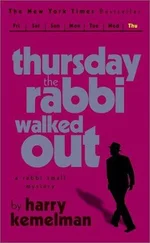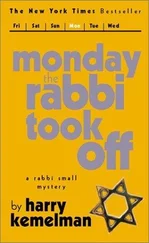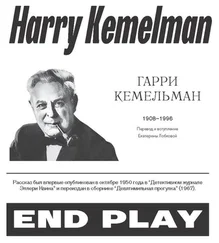"Why not? He was getting about nine dollars an hour for it," she remarked.
But the rabbi refused to be dampened. "I'm sure it wasn't that. It's a sense of superiority. You're bound to get a lift to the ego from dispensing information about anything you know better than others, and when that knowledge can change a person's way of living, his lifestyle, it's even more satisfying. It's quite something this— this ego trip, I think the students call it."
"I'm not sure they consider it a particularly nice thing, David. I think they use the term disparagingly."
"Really? Well, that just shows how little they know. I suppose it's part of the Anglo-Saxon ethic. In sports, for example, the champion is taught to attribute his success to his trainer or his teammates or to luck, to anything except his own superiority. It's so obviously false. No one believes it, but the tradition continues, all I can say is that I frankly enjoyed my first lecture."
"So I see,” she said. "And it's done wonders for your modesty."
"I was only trying to answer your question,” he said stiffly, and then they looked at each other and both smiled.
But Miriam was anxious to pursue it. "But lecturing is nothing new to you. You give a sermon, which is a lecture of sorts, every Friday night and on all the holidays."
"No," he said, "sermons are different, they involve moralizing, which, come to think of it, is just what they said Rabbi Lamden used to deliver when he ran the course. Besides, the people who hear my sermons are the people who pay my salary, and I always have the feeling they're judging me to see if they're getting their money's worth."
She was amused. "Oh David. I don't know where you get that idea."
"Besides, their minds are all fixed, their thought patterns crystallized. Nothing I say is apt to influence them. But these young people in school, they're not frozen, they're not afraid to express their ideas. Mostly they're wrong, of course, but they hold them tenaciously and are ready to argue them, there was a girl today, obviously Women's Lib, who tried to heckle me—"
"That I would have liked to see." laughed Miriam.
The rabbi laughed, too. "She wasn't bad, at that."
* * *
He looked forward eagerly to his next lecture on Friday, the street was practically empty when he pulled up in front of the administration building, and for a moment he wondered if perhaps his watch was slow; but as he strode down the corridor he could hear voices from his classroom, as he pushed open the door, he thought he must have made some mistake. Only a scattering of students was present, then he had the sickening feeling that he had misjudged their reaction to his first lecture, he forced a smile. "The class seems to have shrunk."
Several of the students smiled back and one volunteered. "Most of the kids cut on Fridays to get a head start."
"A head start? A head start for what?"
"Oh, you know, for the weekend."
"I see." He understood now why the Dean had been apologetic about scheduling his course for Friday afternoon, he was nonplused, not sure how to proceed. Should he go ahead with the material he had prepared or devote the hour to reviewing his last lecture so that the absentees would not fall behind? He decided to deliver the lecture, but it was not the same, he could not help feel indignant, and he was sure the students were aware of it and took a perverse pleasure in his discomfiture.
At last the class was over, but his annoyance lasted all the way home. Fortunately, Miriam was busy preparing for the Sabbath, so there was no time to discuss it.
The following Monday he had full attendance again: twenty-eight. On Wednesday, too; but on Friday there were even less than the previous week: only ten, and so it continued: good attendance on Mondays and Wednesdays, a mere handful on Fridays.
When after a month they had finished the Pentateuch, he announced a quiz— for Friday. It was a declaration of war on his part.
"Are we going to be responsible for all the names? You know, so-and-so begat so-and-so?"
"No, but I will expect you to know certain genealogical material. Certainly, you ought to know the names of Adam's children, or Abraham's."
"Couldn't we have the test on Monday?"
"Do you think you will be luckier then?"
"No, but we could have the weekend to prepare for it."
"Look at it this way. Now you can have the whole weekend to recover."
He stopped off at his office on Friday, and Professor Hendryx, seeing the bluebooks, looked up in surprise.
"You enjoy giving quizzes. Rabbi?"
"Not particularly. Why?"
"Because anyone quizzing on Friday has to quiz twice." said Hendryx. "I don't understand."
"Simply that you have to prepare not only the original, and then read the bluebooks and make all those comments in red in the margin and grade them, but the makeup as well. You can't expect more than half your class to turn up on at Friday."
"Oh, I think they'll all be there today." said the rabbi confidently. "I gave them plenty of notice and impressed on them this was an hour exam and important to their grades."
But he arrived at the classroom to find only fifteen students, he spent the hour walking about the room as the students wrote, as each finished, he would hand in his paper and hurry out of the room. Long before the bell rang the rabbi found himself alone.
He graded the papers over the weekend and returned them on Monday, there was an immediate reaction.
"You said we wouldn't be responsible for the begats."
"Benjamin is hardly just one of the begats. Benjamin is an important part of the Joseph story."
"How much will this count toward the final grade?"
"It depends on how many hour exams I decide to give."
"Will they all be given on Fridays?"
"I can't say. Probably."
"Gee, that's not fair."
"Why not?"
"Well— a lot of us— I know I can't get here Fridays."
”This was it, he said coolly, "I'm afraid I don't understand. The Friday session is a regular class hour. If it conflicted with some other course, you shouldn't have arranged to take this one."
"It's not that it conflicts—"
"Yes?"
"Well, I drive back to New Jersey weekends and I've got to get an early start."
The rabbi shrugged his shoulders. "I don't know the answer to that."
He opened his text to indicate that he considered discussion closed, but the atmosphere was charged, the students, even those who had taken the examination, were sullen. His lecture suffered as a result, and for the first time he dismissed them before the hour.
When he returned to his office, he found Hendryx stretched out in his usual reclining posture, puffing gently on his pipe.
"How's it going, Rabbi?"
"Well, I'm not sure." In the few weeks that he had been teaching, he had seen Hendryx less than a half dozen times, and then usually for only a few minutes before or after class. "I get about twenty-six in my class, actually the official class list shows thirty, but twenty-eight is the most that have appeared at any one time."
"That's not bad." said Hendryx. "In fact, darn good where students are allowed unlimited cuts."
"Well, I'm not dissatisfied with the attendance on Mondays and Wednesdays, but on Friday afternoons I'm lucky if I get a dozen."
"At one o'clock? On Friday? I'm surprised you're getting that many."
"But why?" the rabbi insisted. "I can understand that one or two might have a trip planned for the weekend and want to make an early start—"
"They've all got plans for the weekend. Rabbi. If it's a girl, she's been invited to another college for the football game on Saturday. If she attends your class, she finishes at two and can't start much before three, so she'll get wherever she's going too late for all the fun on Friday.
Читать дальше










